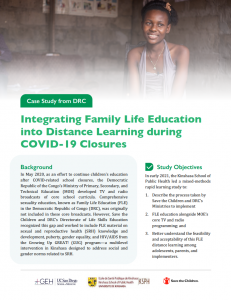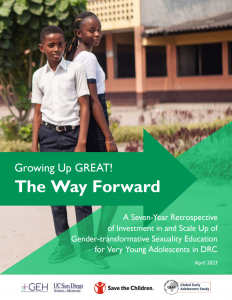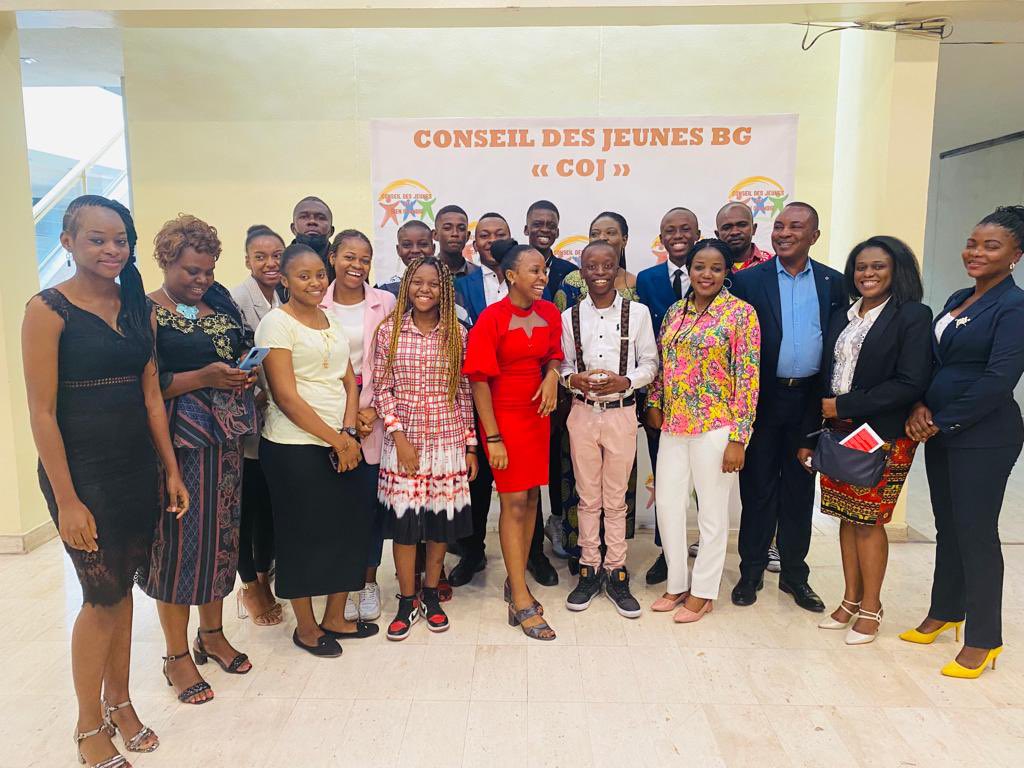This final phase, Scale-Up & Sustainability, focused on efforts to sustain and broaden GUG reach. Activities included:
After more than a year of scale-up preparations (Phase 4), in late 2019 GUG Leadership and members of the Resource Team launched adapted club- and community-based activities, led directly by schools and two NGOs. School focal points and administrators worked with GUG national trainers from the Ministry of Primary, Secondary, and Technical Education (EPST) Family Life Education Directorate (DEVC) to train teachers, used the Ministry of Education (MOE)’s new school club protocol to re-establish very young adolescents (VYA) clubs, and identified and trained VYA club committees. NGOs established community-based clubs for out-of-school VYAs. In addition, the GUG project team worked closely with BG+ (GUG’s sister project for older adolescents) to expand reach.
 In March 2020, all activities paused due to COVID-19 school closures and lockdowns. In response, in April 2020 the EPST shifted core educational curricula to TV and radio broadcasts. Family Life Education (FLE) was originally not included in these broadcasts. In response, GUG leadership worked with the EPST/DEVC and UNICEF to integrate elements of the GUG toolkit on puberty and FLE into the broadcasts. The GUG team then conducted a rapid study to document these efforts and assess the acceptability of FLE distance learning among adolescents and their families. In mid-2021, after COVID restrictions were lifted, in-person GUG activities picked back up and school-based activities were re-established.
In March 2020, all activities paused due to COVID-19 school closures and lockdowns. In response, in April 2020 the EPST shifted core educational curricula to TV and radio broadcasts. Family Life Education (FLE) was originally not included in these broadcasts. In response, GUG leadership worked with the EPST/DEVC and UNICEF to integrate elements of the GUG toolkit on puberty and FLE into the broadcasts. The GUG team then conducted a rapid study to document these efforts and assess the acceptability of FLE distance learning among adolescents and their families. In mid-2021, after COVID restrictions were lifted, in-person GUG activities picked back up and school-based activities were re-established.
To support institutionalization and sustainability of community-based activities, GUG leadership worked with MOH and local health zone teams to transition activities to local health and social protection cadres (Relais Communautaires (RECO)/Réseaux Communautaires de Protection de l’Enfant (RECOPE)) linked to the Democratic Republic of the Congo (DRC)’s public health system. Additionally, in January 2022, the Ministry of Social Affairs (MOSA) supported establishment of GUG clubs at educational remediation centers (Centres de Rattrapage) as part of efforts to institutionalize GUG for out-of-school adolescents (especially girls). To understand the processes and identify potential challenges with these transition efforts, GUG Leadership conducted a rapid qualitative learning study. The study was designed together with school leadership, the RECO/RECOPE, representatives of the EPST and PNSA, and CBOs. Study results were shared in a series of learning and reflection meetings with stakeholders in August 2022, resulting in roadmaps solidifying each Ministry’s roles and responsibilities for sustaining GUG.
 During this period, two additional waves of data were collected among the GEAS-Kinshasa cohort. This allowed GUG Leadership to understand the long-term impact of GUG, as well as adolescents’ experiences as they aged with respect to contraceptive knowledge/use, gender-based violence, relationships, pregnancy, and healthcare seeking. Evaluation findings at Wave 4 and Wave 5 showed that GUG had lasting effects on some dimensions of sexual and reproductive health knowledge and gender norms and attitudes three and four years after the intervention ended. Additionally, long-term novel impacts emerged in the endorsement of gender-stereotypical roles and sexual double standards, as adolescents became more romantically engaged and sexually active.
During this period, two additional waves of data were collected among the GEAS-Kinshasa cohort. This allowed GUG Leadership to understand the long-term impact of GUG, as well as adolescents’ experiences as they aged with respect to contraceptive knowledge/use, gender-based violence, relationships, pregnancy, and healthcare seeking. Evaluation findings at Wave 4 and Wave 5 showed that GUG had lasting effects on some dimensions of sexual and reproductive health knowledge and gender norms and attitudes three and four years after the intervention ended. Additionally, long-term novel impacts emerged in the endorsement of gender-stereotypical roles and sexual double standards, as adolescents became more romantically engaged and sexually active.

In August 2022, Save the Children and the Youth Advisory Committee (YAC) held two days of meetings in communities to share GEAS and youth-led participatory evaluation findings and discuss the YAC’s contribution to the GUG project journey. In December 2022, Save the Children staff and members of the YAC attended PNSA’s Health and Well-being of Adolescents and Youth quarterly task force meeting to present on YAC and the broader GUG consortium’s accomplishments and share policy recommendations to improve adolescent sexual and reproductive health in the DRC.
Nearing completion of this project (early 2023), GUG Leadership assessed their efforts to reach more VYAs with gender-transformative family life education curricula by integrating GUG into MOE, MOH, MOSA and local organizations’ systems and strengthening partners’ capacities. The results of scale-up activities are documented in the final scale-up assessment report organized by the 24 benchmark indicators. Highlights include:
These successes were possible in part because of strong acceptance and ownership among health and educational authorities at national, provincial, and local levels. Partnering with stakeholders and using continuous learning and adaptive management across all five phases allowed the team to develop approaches and materials that aligned with national programs and services. The GUG journey continues via ongoing advocacy efforts from GUG allies for allocation of national financial resources and personnel in ministry workplans in support of VYA reproductive health.